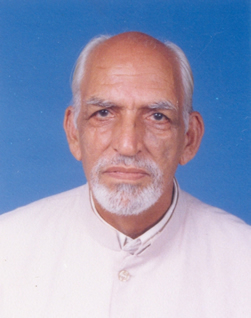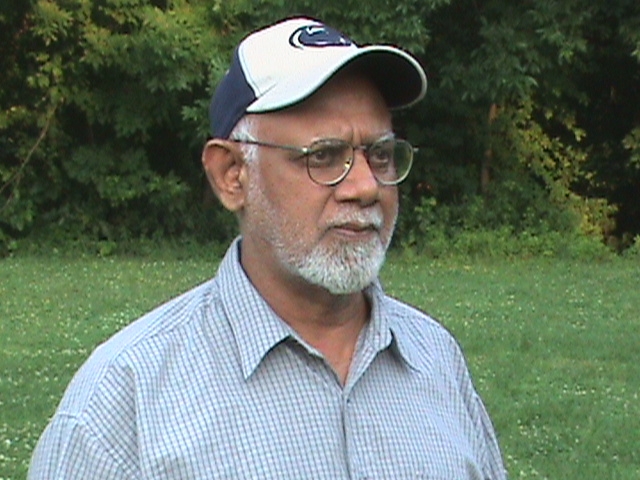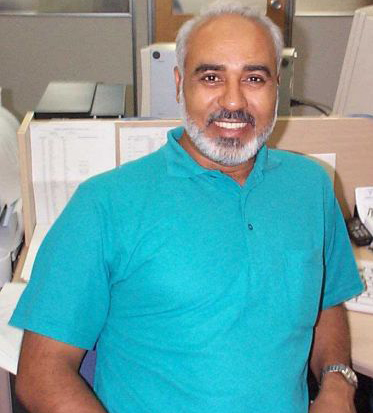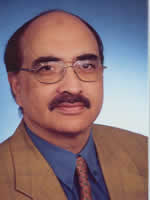
Let me indicate, not for any pride but as a humble expression of gratitude, Tahdis-e-Naimat, some unique aspects of my long association with T.I. College. I ws a student of the very first batch when the college started in Qadian in 1944 and had all my education inthat institution right up to M.A. I was the first M.A. when the college was in Lahore. This needs to be explained. At the time of partition, when Non-Muslims left, there was shortage of teachers and it was decided that for post-graduate studies, students enrolled in colleges and their common instruction arranged at the University. So I was the only flag-bearer of T.I. College, not only in the Economics department, but also in the entire University. I was able to combine studies with sports at a fairly high level. I had my first lesson in Economics from the Principal, Hadhrat Mirza Nasir Ahmad Sahib, who later became the third Khalifatul Masih (akshsalam). He taught Economics on for two years as no other teacher of the subject was available. He gave that up when Faiz-ur-Rehman Faizi Sahib, the younger brother of famous Malik Abdur Rehman Khadim Sahib of Gujrat joined the college staff. Thereafter he taught Political Science.
My interest in Economics continues even after retirement. Though with some shift in focus. I occasionally write on current problems of Pakistan, not just for the sake of writing or to satisfy my ego, but only when I am really infuriated with the situation. With my rate exposure to both monetary and fiscal management, I highlight, without fear or favour, those aspects of the problems which may be lost sight of or deliberately held back so far. More than one hunred articles have been published, mostly in the DAWN. However, my main focus, rather pre-occupation, is Islamic Economics, with particular emphasis on interest-free economic system. I have already published a 545-page book titled “Islam, Philosophy of Life and Economic Principles” and am currently working on follow up entitld “Interest-free Economy” which is likely to be of the same size.
This is an attempt to dispel the common notion that interest cannot be abolished and provide a workable alternative. (God willing- wa ma taufiqi illah Biallahil Azim) To my mind, those who entertain the idea that interest cannot be abolished doubt the two basic attributes of Allah, that is his being Khabir (all aware) and Qadir-e-Mutiq (Almighty) He certainly knew when He revealed the Holy Quran how the Economic system will develop in future and has all the power to enforce His edict to abplish interest. Interest, therefore, has to go The Quranic warning “ O ye who believe! Fear Allah and relinquish what remains of interest, if you are believers. But if you do it not, then beware of war from Allah and His Messenger” (2:279-280) is being implemented through the current global economic crisis, which is primarily due to interest-based economic system. I had summed up the prevailing situation in my article “Failure of Debt-Driven Model”, published in the DAWN of April 18, 2011 (Dawn.com/business). My analysis of the current great recession already runs into 200 pages. The situation is quite fluid, particularly in the European Union, where a clear effective approach is awaited. As soon as it crystalizes , I plan to put out a booklet entitled “The Great Recession- 2008-9, Experience and Lessons.” Without waiting for the completion of the book, with the material available that should also be soon (God Willing) Hazrat Khalifatul Masih V, (ayedehullah taala) desired a committee, consisting of Ulema and experts, be set up in Darul Qaza to consider the problem of mortgage and other interest dealings. Hazoor nominated me as a member. I wrote a paper of 75 pages “Hurmate Sud” – prohibition of interest in April 2010. The shadows are lengthening. Statistically speaking, at 83, I am on bonus when the average span of life for males in Pakistan is 65. I wish to leave behind something worthwhile. For this, I badly need and humbly request help through prayers. Finally, a word of advice for Ahmadis living in the West. Do not be overwhelmed by your environment. Take cognizance of the menace of consumer credit and do your best to avoid it. This is not only following Islamic teachings of living within ones means, but also necessary for their real welfare. Islam does not allow raising ones standard of living by borrowing, even if the loan is interest free. One of the basic demands of Tehrik-e-Jadid is simple living. I am sure if they keep their eyes open, they can easily see havoc around them due to consumer credit in the recession. If not, let me give some cold statistics about the bitter experience, particularly in the United States, and the lesson already learnt before the recession, mot of the commeon people there were heavily indebted and little personal saving. The recession has made them cautious and they have started saving. As a result, household saving in the US has increased from $ 242 billion in 2007 to $ 608 billion in 2011. At the same time, they have reduced their consumer credit. Outstanding revolving consumer credit declined from $ 846 billion to $ 383 billion, or less than half….
CV of Dr. Abdul Karim:
Date of Birth 1-1-1929
Education
Matric-T.I.High School, Qadian (1944)
F.A.-T.I.College, Qadian (1946)
B.A.-T.I.College, Lahore (1948)
M.A. (Econ)-T.I.College, Lahore (1951)
Ph.D. (Econ)-George Washington University, Washington D.C.(1966)
Sports
Captain T.I.College football (1944-46) and hockey (1946-51) teams. In hockey also represented University (1950) and Province (1952)
Service
Joined State Bank of Pakistan-5-51952
Retired-31.12.1988 as Economic Advisor in Grade 21
Deputation
Seconded to Ministry of Finance, Government of Pakistan twice-1954-58,1969-78
Foreign Assignment
IMF Advisor, Bank of Sudan, Khartum, August 1986-October 1987
Asian Development Consultant, Bhutan, March-September 1989
Teaching Experience: Visiting Professor, State Economic University, Tashkand, Uzbikstan, March-September, 1994(Wakfe Arazy)
Publications..
Assistant Editor, T.I.College Lahore magazine “Young Economist” 1950
Islam: the Basics, a collection of articles published in the Friday feature of Dawn, 2004
Islam: Philosophy of life and Economic Principles, 2004
Interest Free Economy (forthcoming, God willing)
Occasional articles on Economic problems of Pakistan in weekly feature, Economic and Business Review on Mondays in Dawn (dawn.com)



